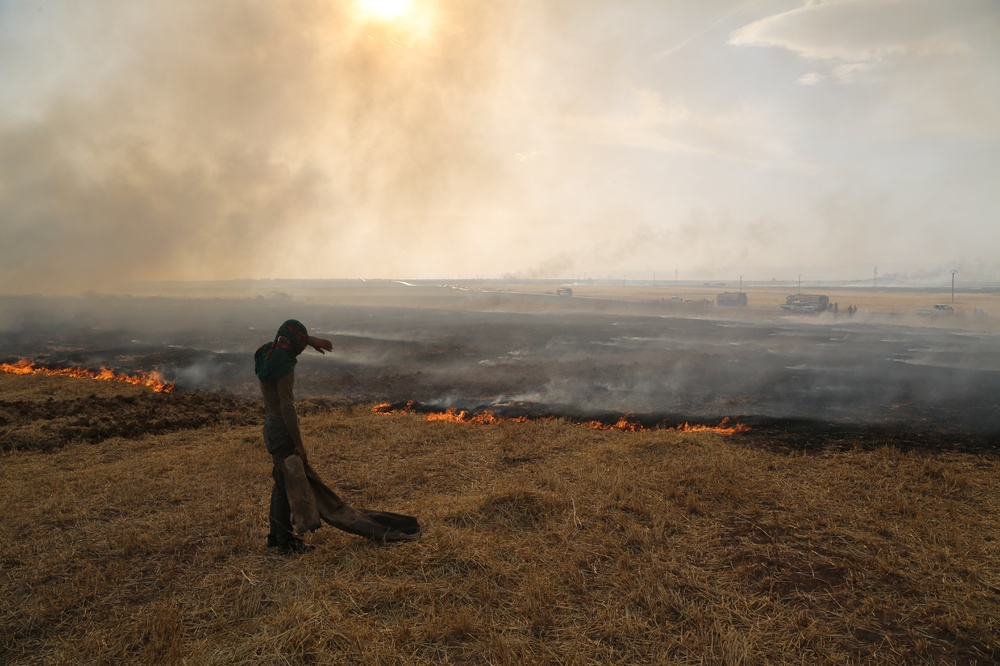Hundreds of thousands of acres of farmland in the Hasakah governorate in northeast Syria have been scorched by fires, according to new satellite analysis conducted by PAX.
A substantial number of the fires are the result of ongoing tension between Turkish-backed Syrian militias and the Kurdish-led Syrian Democratic Forces in northeast Syria, and may have various causes. Shelling along the frontlines is likely to have ignited fires, leaving blackened earth as crops and grazing land have burned. Deliberate torching of farmland may also be a tactic to destroy livelihoods in local communities. The so-called Islamic State has also made calls to burn cropland. This part of Syria, known as the ‘breadbasket of the country’, suffered from similar fires last summer (2019) when many farmers lost their harvest.
Turkish invasion and escalation of the conflict
In October 2019, militias united under the banner of the Syrian National Army (an opposition force, not to be confused with Syrian government forces) and supported by Turkish armed forces entered this part of the country. The region has been under control of the self-proclaimed Autonomous Administration of North and East Syria, led by the Kurdish Democratic Union Party (PYD). The incursion was stopped when Russian and Syrian government forces were deployed to the frontlines and a ceasefire was agreed, but tensions among the armed groups remain. In May and June of this year, local media reported clashes and exchange of fire between the armed groups resulting in large fires on farmland. Elsewhere, fires threatened oil installations.
PAX collaborated with its local partner Syrians for Truth and Justice, who conducted interviews with people from affected areas who tell how they have suffered from the fires: “I saw my husband in pain due to the burns, which he got for the love of his land and crops. Farmers tend to treat their land the way they treat their children,” says a women from Tell Nasri, a small town close to the frontlines who’s cropland burned in a fire in May.
Remote sensing analysis with Sentinel-2 satellite imagery conducted by PAX indicated that roughly 436.882 acres of land were burned in Hasakah governorate between May 15 to July 25,3.543 fires were spotted in this period. This analysis also marks the launch of the Environment and Conflict Alert, a series of rapid environmental analysis in conflict-affected areas. As part of its work on environment, peace and security, PAX will use satellite imagery and open-source investigation in collaboration with local partners to provide rapid insight into specific environmental dimensions of armed conflicts.
Wim Zwijnenburg, Project Leader at PAX: “Our aim is to use innovative research and earth observation to visualize the direct and long-term consequences of environmental damage and their impacts on lives and livelihoods of people in conflict-affected areas. These issues deserve closer scrutiny in the wider analysis of armed conflict and in post-conflict reconstruction.”
Multiple causes of the fires
Apart from direct hostilities, the region is facing larger issues that contribute to the increasing number of wildfires. The rising heat in the region caused by the climate-crisis result in longer periods of drought which in turn create the conditions for accidental burning, whether caused by sparks from agricultural equipment or by discarded cigarette buts. The situation is also aggravated by the lack of fire-fighting equipment and insufficient water sources. The problems with crop revenues and livelihoods of affected farmer communities are compounded by the looming economic crisis due to the devaluation of the Syrian pound. PAX calls for direct support through equipment and expertise to improve firefighting services and compensation for affected communities.
Environment and Conflict Alert: Burned area analysis in northeast Syria
Front Lines Aflame, full report by Syrians for Truth and Justice




